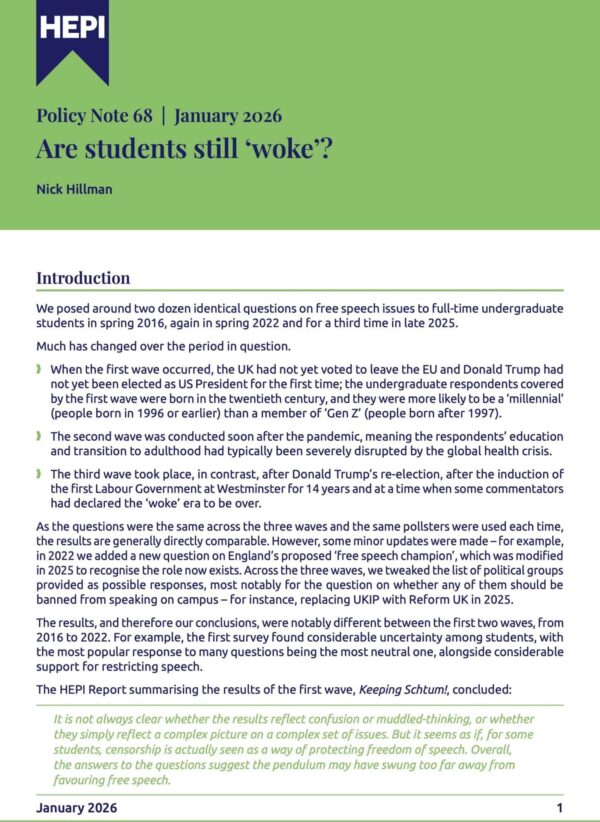Defunding Level 7 apprenticeships will undermine widening participation efforts in Higher Education
This blog was kindly authored by Professor Abigail Marks, Associate Dean of Research, Newcastle University Business School, and member of the Chartered Association of Business Schools Policy Committee.
From January 2026, public funding for the vast majority of Level 7 apprenticeships in England will be withdrawn for learners aged 22 and over. Funding will remain for those aged 16 to 21, alongside narrow exceptions for care leavers and learners with Education, Health and Care Plans. Current apprentices will continue to be supported. Ministers present the change as a rebalancing of spending toward younger learners and lower levels, where they argue returns are higher and budgets are more constrained.
At first sight, this decision looks like a simple trade-off: concentrating scarce resources on school-leavers and early career entrants, while expecting employers to bear the costs of advanced, Master’s-level training. For business schools, however, particularly those that have invested in Level 7 pathways, such as the Senior Leader Apprenticeship, the implications for widening participation are likely to be profound. The Senior Leader Apprenticeship is often integrated with an MBA or Executive MBA. Alongside this, many institutions align Level 7 apprenticeships with specialist MSc degrees, often with embedded professional accreditation. In essence, Level 7 apprenticeships in business schools provide structured, work-based routes into advanced leadership and management education, usually culminating in an MBA or MSc.
Why Level 7 apprenticeships matter for widening participation
Since the apprenticeship levy was introduced in 2017, Level 7 programmes have provided business schools with a powerful route to widen participation, particularly among groups that have been historically excluded from postgraduate education. According to the Department for Education’s 2023 Apprenticeship Evaluation, almost half (48 per cent) of Level 7 apprentices are first-generation students, with neither parent having attended university, and around one in five live in the most deprived areas of the country. Analysis by the Chartered Association of Business Schools shows that in 2022/23, a quarter of business and management Level 7 apprentices held no prior degree qualification before starting, with a small minority having no formal qualifications at all. The age profile further underscores the differences between these learners and conventional Master’s students, with 88 per cent of business and management Level 7 apprentices aged over 31, indicating that these programmes primarily serve mature learners and career changers rather than recent graduates.
This picture contrasts sharply with the traditional MBA market, both in the UK and internationally. Research on MBA demographics from the Association of MBAs in 2023 highlights that students are typically in their late twenties to early thirties, often already possessing a strong undergraduate degree and professional background, and participation is skewed toward those with access to significant financial resources. An Office for Students analysis of Higher Education Statistics Agency data shows that conventional graduate business and management entrants are disproportionately from higher socio-economic backgrounds, with lower representation from disadvantaged areas compared to undergraduate cohorts. In practice, this means that the subsidised Level 7 apprenticeship route has been one of the few mechanisms allowing those without financial capital, prior academic credentials, or family background in higher education to gain access to advanced management education in business schools.
The economic and societal cost of defunding Level 7
Employer behaviour is likely to shift in predictable ways once the subsidy is removed. Some large levy-paying firms may continue to sponsor a limited number of Level 7 places, but many smaller employers, as well as organisations in the public and third sectors, will struggle to justify the full cost. Data from the Chartered Management Institute suggests that 60 per cent of Level 7 management apprentices are in public services such as the NHS, social care, and local government. Less than 10 per cent are in FTSE 350 companies. Consequently, there is a risk of further narrowing provision to those already in advantaged positions.
The progression ladder is also threatened. Level 7 apprenticeships have been a natural progression for people who began at Levels 3 to 5, building their qualifications as they moved into supervisory roles. Closing the door at this point reinforces the glass ceiling for those seeking to rise from technical or frontline work into leadership. With data from the Department for Education reported in FE Week reporting that 89 per cent of Level 7 apprentices are currently aged over 22, the vast majority of those who have benefited from these opportunities will be excluded from January 2026.
The consequences extend beyond widening participation metrics. Leadership and management skills are consistently linked to firm-level productivity and the diffusion of innovation. Studies such as the World Management Survey have shown that effective management correlates strongly with higher productivity and competitiveness. Restricting adult access to advanced apprenticeships risks slowing the spread of these practices across the economy. For business schools, it reduces their ability to act as engines of regional development and knowledge transfer. At a national level, the UK’s prospects for growth depend not only on new entrants but also on upskilling the existing workforce. Apprenticeships have been one of the few proven ways of achieving this. If opportunities narrow, it is possible that firms may struggle to adopt new technologies, deliver green transitions, or address regional productivity gaps. The effects may also be felt in export performance, scale-up survival, and international competitiveness.
The removal of public funding for adults over 21 threatens to dismantle a pathway that has enabled business schools to transform the profile of their postgraduate cohorts. Where once mature students, first-generation graduates, and learners from deprived regions could progress into Master’s-level management education, the policy shift risks returning provision in England to a preserve of the already advantaged. In contrast, our European counterparts, where degree and higher-level apprenticeships retain open access for adults, will continue to allow business schools to deliver on widening participation commitments across the life course.
Lessons from Europe
Germany’s dual study system has expanded, with degree-apprenticeship style programmes now making up almost five per cent of higher education enrolments. Data from the OECD shows that the proportion of young adults aged 25–34 with a tertiary degree in Germany has risen to around 40 per cent, driven partly by these integrated vocational–academic routes. Switzerland shows even more dramatic results: between 2000 and 2021, the share of 25–34-year-olds with a tertiary qualification rose from 26 to 52 per cent. Crucially, Switzerland also leads Europe in lifelong learning, with around 67.5 per cent of adults aged 25–65 participating in continuing education and training. For Swiss business schools, this creates a mature, diverse learner base and allows firms to continually upgrade leadership and management capacity. Both countries demonstrate how keeping lifelong pathways open is central to sustaining firm-level productivity, innovation, and international competitiveness.
Conclusion
The decision to defund most adult participation at Level 7 thus represents more than a budgetary tweak. It narrows opportunities in advanced management education and risks reversing progress in widening participation. Unless English business schools, employers, and policymakers act swiftly to design new pathways, the effect will be a return to elite provision. More worryingly, England risks falling behind international counterparts in building the leadership capacity that underpins innovation, productivity, and growth.







Comments
albert wright says:
I don’t see the defunding of level 7 appreticeships will result in the disaster described above because many of the current individuals will still be eligible for Life Long Learning support taking them to level 6.
The salaries they are likely to be earning by that time, should enable them to pay their own way in getting higher qualifications. Afterall, if they have not been undergraduates or post graduates, they will not be paying back their student loans.
Given that a high proportion of the current cohort are employed by the public sector they should be able to negotiate some part of their generous public sector pensions to boost current pay and be able to pay their own way.
The apparent success recorded by Germany and Switzerland would seem to be another route that could be followed but I may be wrong as I don’t know the details of how their higher qualifications are funded regarded to tax payer funding.
Reply
Add comment